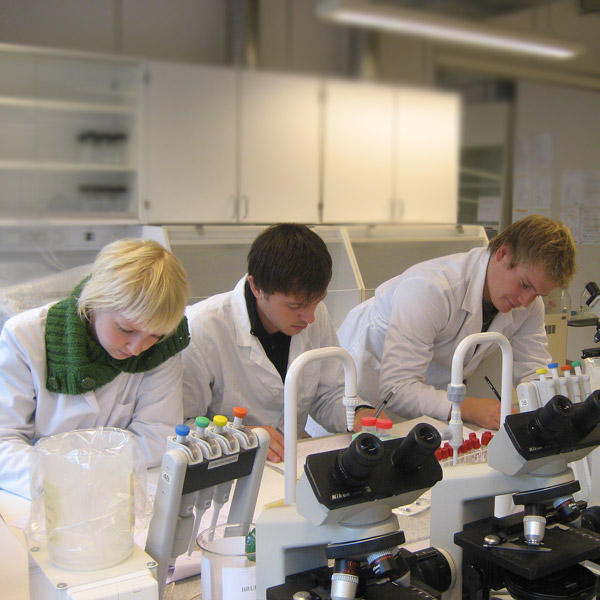Admission to courses with limited capacity
List of courses with limited capacity
Main content
How to register for courses with limited capacity
You apply for the courses on Studentweb after the registration opens.
Click "class registration" to save your application.
The deadline for spring class registration is 23:59, Wednesday 7th January 2026 (UTC+1).
Enrolment for the courses will be processed by the following monday. Please check studentweb after the results are published.
First priority will be given to students who have the course in question as a compulsory part of their study programme.
Students who have been admitted to the course will be registered for examination.
It is compulsory to attend the first lecture of the courses with limited capacity. If you don't attend, you may lose your place on the course.
List of courses with limited capacity - Spring semester 2026
Click the course code for more information on each course
Course code | Course name (Norwegian) |
Organismebiologi for fiskehelse og havbruk | |
Havbruksteknologi | |
Molekylærbiologisk diagnostikk av fiskesykdommer | |
Praksis i havbruk | |
Profesjonsutøvelse og praksis i fiskehelse | |
Organismebiologi | |
Cellebiologi og genetikk | |
Komparativ fysiologi | |
Praksisperiode, lovverk og forvaltning i akvakultur | |
Lovverk og forvaltning i fiskehelse og havbruk | |
Næringsmiddelmikrobiologi med spesiell relevans til sjømat | |
Miljøpåvirkning av oppdrett | |
Evolusjonsbiologi | |
Toksikologi | |
Molekylær mikrobiologi | |
Marin bentisk fauna | |
Fiskesykdommer - Virologi | |
Fiskesykdommer - Bakterier, sopp og ikke-infeksiøse sykdommer | |
Fiskesykdommer - Farmakologi | |
Norges natur - naturvariasjon, kunnskapssystem, kartlegging | |
Metoder for reproduserbar og åpen vitenskap | |
Ordinasjon og gradientanalyse | |
Utvalgte emner i miljøtoksikologi | |
Aktuelle geobiologiske tema | |
BIO335 | Populasjongenetiske metoder |
Teori og praksis for bærekraftig forvaltning av levende marine ressurser | |
Bestandsovervåking og ansvarlig høsting | |
Prinsipper for økosystemforvaltning | |
Global økolog og biodiversitet | |
Celle- og utviklingsbiologi | |
Fiskesykdommer - Virologi | |
Fiskesykdommer - Bakterier, sopp og ikke-infeksiøse sykdommer | |
Numeriske metoder for prosessteknologi | |
Energi fra havvind del I | |
Energi fra havvind del II | |
Vitenskapelig skriving og formidling | |
Eksperimentelle metoder i reservoarfysikk | |
Simulering av flerfasestrømming i porøse media | |
Farmasøytisk fysikalsk kjemi | |
Analytisk kjemi | |
Atmosfære-, hav- og klimadynamikk | |
Numerisk modellering | |
Praktisk meteorologi og oseanografi | |
Numerisk værvarsling og klimamodellering | |
Feltkurs i meteorologi | |
Videregående kjemisk oseanografi | |
Fysisk oseanografi i fjorder | |
Polar oseanografi | |
Avansert dynamisk oseanografi | |
Avansert klimadynamikk | |
Seminar i atmosfærisk vitenskap | |
Avansert atmosfæredynamikk | |
Ekskursjoner og øvelser i geologi | |
Innføring i strukturgeologi og tektonikk | |
Samspill mellom Jorden og Livet | |
Geofysiske metoder | |
Geologisk feltkurs på Vestlandet | |
Hydrogeologi | |
Bergartsfysikk | |
Feltkurs i kvartærgeologi og paleoklima | |
Maringeologisk felt- og laboratoriekurs | |
Petrologi | |
Feltkurs i geologisk kartlegging | |
Bassenganalyse og tolkning av undergrunnsdata | |
Global og anvendt geofysikk | |
Geopraksis | |
Dataanalyse i geovitenskap | |
Praktiske ferdigheter i fjernmåling og romlig analyse | |
Masterekskursjon i kvartærgeologi | |
Glasiologi | |
Kvartær geokronologi | |
Paleoseanografi | |
Den geokjemiske verktøykassen | |
Regionalgeologisk feltkurs til Vestlandet | |
Reservoargeologisk feltkurs | |
Videregående klastisk sedimentologi | |
Avansert anvendt seismisk analyse | |
Praksisutplassering i havteknologi | |
Laboratoriekurs i måleteknologi og instrumentering | |
Innføring i programmering | |
Programmering II | |
Avansert funksjonell programmering | |
Algoritmeutvikling | |
Dataorientert visuell beregning | |
Dyp læring | |
Forsterkningslæring | |
Metaheuristikker | |
Utvalgte emner i algoritmer og kompleksitet | |
Utvalgte emner i kunstig intelligens II | |
Utvalgte emner i maskinlæring | |
Innovasjon ved designtenking | |
Metoder for analyse av forsyningskjeder | |
Kjemi grunnkurs | |
Organisk kjemi | |
Kjemisk termodynamikk | |
Analytisk kjemi | |
Bachelorprosjekt i kjemi | |
Kvantitativ organisk analyse | |
Algebra | |
Eksperimentell molekylærbiologi I | |
Molekylær cellebiologi | |
Anvendt bioinformatikk | |
Nervesystemets molekylærbiologi | |
Eksperimentell molekylærbiologi II | |
Laboratorieprosjekt i molekylærbiologi | |
Innovasjon i industriell bioteknologi | |
Bioetikk | |
Strukturell Molekylærbiologi | |
Praksisutplassering i Medisinsk Teknologi | |
Bachelorprosjekt i Nanoteknologi | |
Mekanikk 1 | |
Grunnleggende målevitenskap og eksperimentalfysikk | |
Forskningspraksis i fysikk ved CERN | |
FNs Bærekraftsmål 15: Liv på land |
Principles and appeals
Admission to courses is handled by specific principles, unless otherwise stated in the course description.
- If more applicants than seats, apllicants are ranged by points and each student is validated individually
- General points are given for course completion, equivalent to ECTS
- If a course is mandatory in a grade, 1000 extra points are given. This also applies to courses in a master degree agreement plan
- If a course for an exchange student is pre-cleared, 2000 extra points are given
- Students with valid mandatory assignments in a course from before, a previous passing grade or able to only take examinations are prioritized last
- The above point may come into effect even if there are fewer applicants than seats
- Other principles may be in effect, these should be presented in the course description
You can appeal a denied seat in a course, an appeal must be sent to post@mnfa.uib.no and contain the following:
- Course code the appeal pertains
- Your student number
- An explanation, showing why the verdict should be changed
We cannot process appeals unless they include all three points, these will be discarded.
